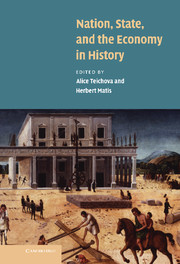Book contents
- Frontmatter
- Contents
- List of figures
- List of tables
- List of contributors
- Acknowledgements
- Introduction
- PART I
- PART II
- PART III
- 12 Nation without a state and state without a nation: the case of Africa south of the Sahara
- 13 The economic foundation of the nation-state in Senegal
- 14 From the Jewish national home to the state of Israel: some economic aspects of nation and state building
- PART IV
- PART V
- Index
14 - From the Jewish national home to the state of Israel: some economic aspects of nation and state building
Published online by Cambridge University Press: 07 September 2009
- Frontmatter
- Contents
- List of figures
- List of tables
- List of contributors
- Acknowledgements
- Introduction
- PART I
- PART II
- PART III
- 12 Nation without a state and state without a nation: the case of Africa south of the Sahara
- 13 The economic foundation of the nation-state in Senegal
- 14 From the Jewish national home to the state of Israel: some economic aspects of nation and state building
- PART IV
- PART V
- Index
Summary
The nurturing of ethno-nationalism, and the building of nations and states, although being primarily political and socio-cultural processes, are obviously not devoid of economic aspects. While we may question whether, and to what extent, economic factors have affected the creation of nations and states, it seems indisputable that economic means and actions, let alone their outcomes and implications, have constituted a significant element in any ethno-national pursuit and state formation.
Noticeable in this respect are, on the one hand, moves of a consolidating nature, which have typically been supportive of economic growth within the state's borders, such as the institution of common currencies, the establishment of unified monetary and fiscal systems, and the integration of internal markets. On the other hand, ethno-nationally induced restrictions on the access of ‘others’ to certain markets, as well as constraints imposed on trade and factor mobility, which by their very nature are output-reducing and income-redistributing, have often accompanied the creation of states and their ‘growing up’ patterns. Such modes of behaviour have usually been externally aimed, but in ethno-nationally heterogeneous states (or states in the making) they have also played a role in frequently emerging internal ethno-national conflicts concerning collective rights, political hegemony and the nature of the states' nation-ness. Likewise, various self-perceived ‘modernising’ and ‘catching-up’ goals, affecting the industrial structure of production, have been a common feature of national economic policies in newly established states.
- Type
- Chapter
- Information
- Nation, State and the Economy in History , pp. 270 - 288Publisher: Cambridge University PressPrint publication year: 2003



